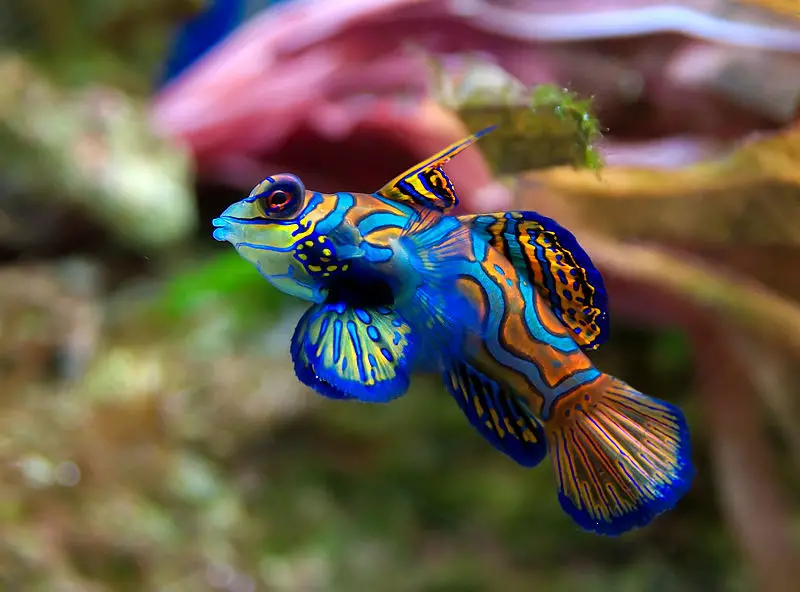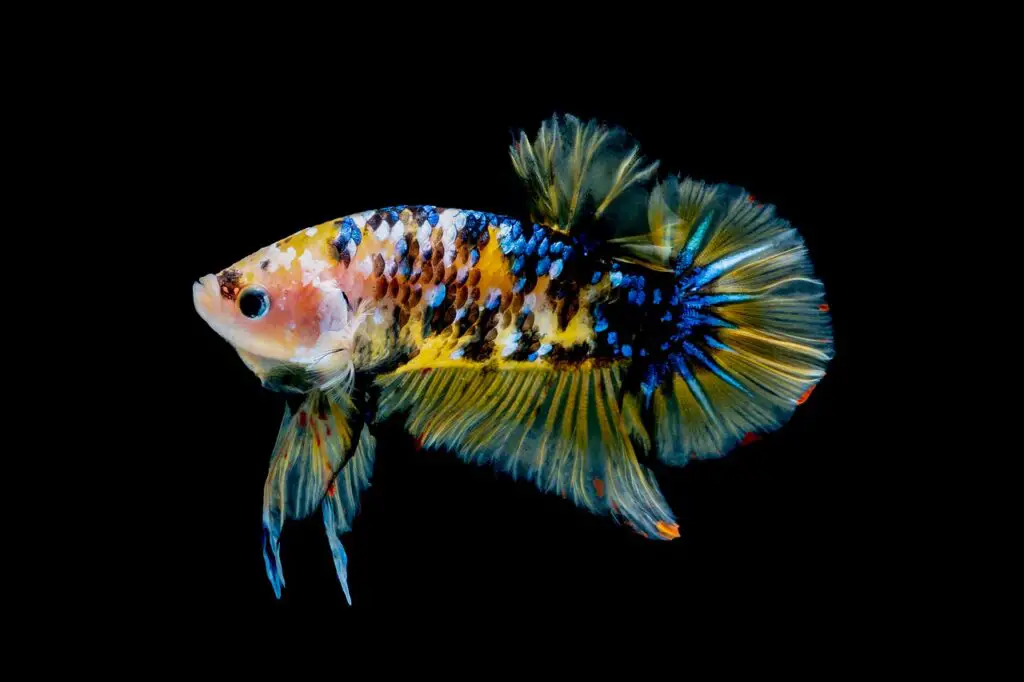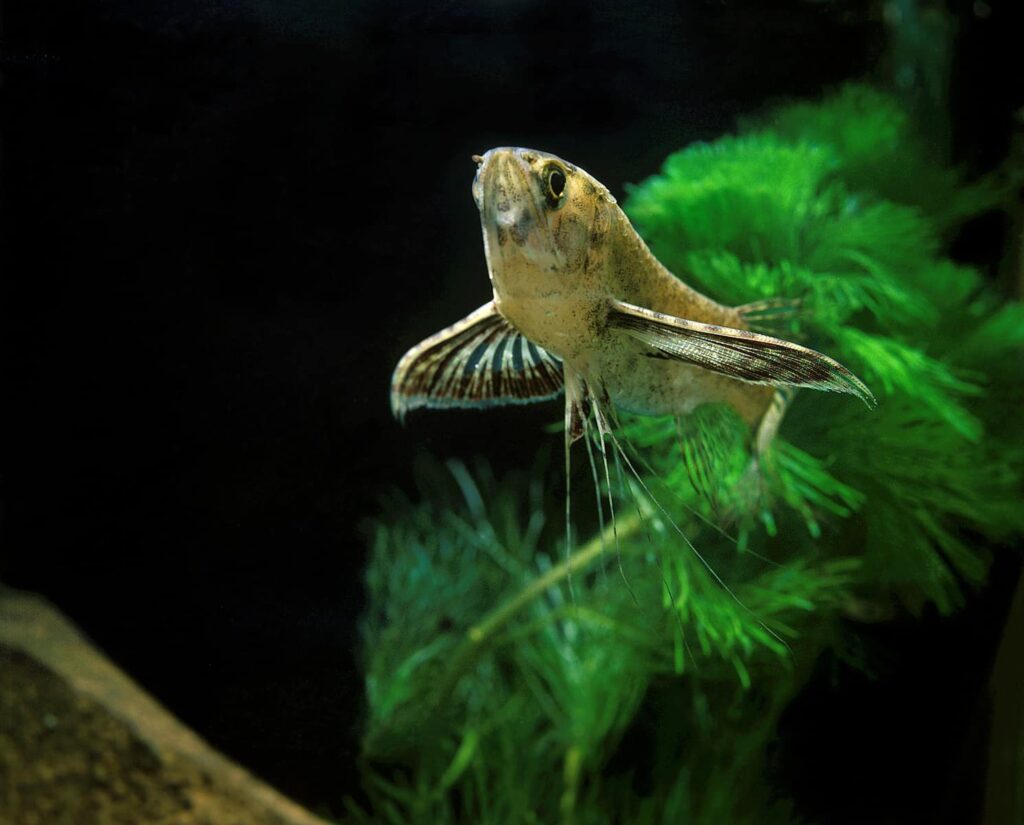Mandarin fish are also known as Mandarin Dragonets. They have a striking colourful appearance and come from the warm waters of the Pacific Ocean. Popular as aquarium fish, Mandarins are beautiful to watch and have distinguishing colours of blue and orange.

Keep reading to find out more about keeping Mandarin fish of your own!
- Fish Lifespan: Up to 4 Years (Up to 15 in the Wild)
- Tank Size: Around 55 Gallons
- Water Temperature: Between 72F and 78F
- pH: Between 8.1 and 8.4
- Hardness: Between 8 and 12 dKH
- Compatibility: Compatible with Clownfish, Cardinals and Damselfish
- Fish Size: Up to 2.5 Inches
How do you take care of Mandarinfish?
As Mandarins are peaceful fish, a calm tank with non-aggressive tank mates is a good starting point. It is ideal to provide them with interesting shapes and rock formations for them to shelter in and hide away if they wish.
As ‘bottom feeders’ they are likely to be found most often in the lower half of the aquarium, moving slowly and gracefully in a calm considerate way. These fish never look for trouble and in fact avoid it all costs!
If you mix your Mandarins with other fish, keep an eye on their size and weight, because a frequent cause of death is starvation when they allow other fish to eat the rations!
This means that, on the whole, the Mandarin can be quite a tricky fish to keep an eye on. As they are so easily bullied, they can often pass away without showing other tank mates who’s boss! That’s why it is so important that you make sure to line these fish up with other critters of similar temperaments and size.

The Mandarinfish does have its own unique defence systems which are well worth reading up on! However, it’s a good idea to try and give these creatures a big enough tank with lots of hiding places so they can go and sneak away if they need to.
These fish can arrive in a variety of colours and subspecies, meaning that one variety is not necessarily going to be the same as the next. These creatures tend to all be fairly shy and retiring, however, despite the fact that their looks really are some of the most stunning you will ever hope to host in a tank at any one time.
Taking care of a Mandarinfish may not, therefore, be a job for a novice fish keeper. We’d probably advise to take on this fish after a few years of practice with your own saltwater tank, mainly to ensure that you know a bit about keeping tanks well balanced and fish well fed. Keeping some fish from bullying and badgering others is never going to be straightforward, so make a point of keeping a very close eye. They are considered difficult to care for.
Are mandarin fish poisonous?
Yes – but don’t panic – it’s unlikely they will harm you!
Interestingly, whilst considered to be one of the most beautiful fish in the oceans, as well as one of the most placid, Mandarins have poisonous tricks up their sleeves!
They are covered in formidable small spikes which have the ability to inject poisonous mucus into attackers! In fact, beneath their extravagantly coloured exterior, they manufacture two types of mucus. One is a toxic deterrent to aggressors, and the other forms a protecting ‘coating’ against arduous elements, rather like an overcoat for extreme conditions.
Mandarins are very placid but have an automatic defence mechanism which can drive potential enemies away and cause significant discomfort to those who threaten them. This is to the extent that survivors may be seen to treat captive mandarins with more respect!
How much does a mandarin fish cost?
Mandarin fish can typically cost up to $40. They can be purchased online or in specialist shops stocking saltwater fish.
Pet centres and specialist suppliers local to where you live may advise you on what is available and the cost in your area – the less distance the fish to have to endure travel the better.

Also, it is ideal to view your fish beforehand if at all possible. This way, you can choose from a selection of fish in a holding tank, and as these fish have a variety of colours, there may be one which particularly attracts you.
Also, you will observe the quality of their living quarters before they arrive home with you. Check the clarity of the water and the condition of other fish. It’s always a good idea to clear up any concerns you may have about the health of your Mandarin fish and any potential conditions it may suffer from.
Where are mandarin fish found?
Mandarin fish can be found in a variety of tropical habitats, however, the blue, green and orange varieties are often found in waters around the Philippines.
This means these fish tend to enjoy fairly warm waters, normally up to 78F, and their tank water should be more on the alkaline side of the neutral scale. Recreating this water in your tank shouldn’t be that difficult, but its shy nature and its other specifics can make it somewhat tricky to look after unless you know what you are doing.
These fish are popularly found in many saltwater aquariums but that doesn’t always mean you can expect them to be common.
What do mandarin fish eat?
Mandarinfish are carnivorous dragonets. This means that, of course, they will largely prey on other creatures. However, as they are so small, they will normally only partake in meat from the brine shrimp or that which you’ll find in live rock.
Therefore, live rock and live sand are really good additions to a Mandarinfish tank. What’s more, serving them brine shrimp as well as black worms is a really good idea. Even better is to try to enrich this meat with vitamins – though there are other bits and pieces you can feed them directly from the pet store or aquarium, too.

These fish can struggle to fight for their food, which means that if there are bigger, bullying creatures available, they may end up going hungry as a result of missing out on a morsel or two – or three! Therefore, always be careful to serve these fish a little bit of their own select food so that they get good meals.
It may even be worth hosting and feeding Mandarinfish on their own if you’re unsure whether or not you can safely balance them! Otherwise, it might simply be best looking for different fish that are easier to handle if you are just starting out.
Are mandarin fish hard to keep?
Yes – Mandarinfish can be very hard to keep as they have specific diets and needs, and what’s more, they often find themselves pushed around by other, bigger and more aggressive fish. That’s why it is so important to find tank mates which are suitable for these critters!
Don’t let anyone push your Mandarinfish around. They are truly beautiful, but with great-looking fish does come a lot of hard work. Therefore, make sure to ask your vet or pet store owner further questions before choosing this fish.
Mandarinfish are fantastic pets for seasoned tank owners, meaning that if you have cared for saltwater beasties for a while now, they might just be a rewarding choice.
Should I adopt a mandarin fish?
Yes! These fish are undoubtedly amongst the most beautiful to be found in any aquarium. They are dramatically coloured, slow moving elegant fish whose grace and appeal is hard to match.
Providing you are either only housing Mandarins or are sure the mix of fish will be non-combative, you should enjoy the aquarium life of relaxing calm happy fish who add an attractive, theatrical almost ‘hypnotic’ show to your home, to enjoyed by everyone entering it.

Mandarins rarely disappoint – reef tanks are usually colourful but with Mandarins, this is all the more so! If breeding is successful, you may even find you have a number of eager friends waiting to adopt offspring from your aquarium!
It should be noted that, if ordering fish online, some colour combinations and sizes are often more expensive than others. Therefore, you may wish to check which colour combinations and sizes are available.
Do also bear in mind that these fish tend to have a relatively short life in captivity as some only survive for 2 to 4 years. If you buy a 1 year old fish, it may only survive for a year or even less!
Breeding your own can resolve this issue, but it is wise to be prepared at the outset, that your first purchases may not live as long as you hoped. Ethical suppliers will be honest about the age of fish but cannot guarantee longevity, so there is always some risk in sourcing and transporting your new Mandarins.
Mandarin fish are amazing talking points and will liven up any reef tank. However, just keep an open mind when it comes to being watchful on the care.



